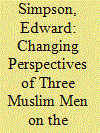| Srl | Item |
| 1 |
ID:
108996


|
|
|
|
|
| Publication |
2011.
|
| Summary/Abstract |
Recent writing on religion in Gujarat has often confused political rhetoric with common religious belief and practice. Thus, religious categories have become caricatures standing for sociological realities and totalised worldviews. In this scheme, 'Hindus' and 'Muslims' are supposed to believe different things which ensure that they see and act in the world quite differently. In this paper, I examine the narratives of blame that emerged after the 2001 earthquake in Gujarat. The ethnography suggests that although religious identity plays a role in the way blame is cast, people of different religious communities also use common frames of logic and their shared experiences of shock and alienation to explain catastrophe. The religious reasoning of blame narratives is therefore shown to have a broader cultural existence outside the boundaries of particular religious identities.
|
|
|
|
|
|
|
|
|
|
|
|
|
|
|
|
| 2 |
ID:
082165


|
|
|
|
|
| Publication |
2008.
|
| Summary/Abstract |
In many religious traditions, those who mediate relations between men and gods are often the focus of controversy and moral ambiguity. The ethnography in this paper outlines a number of perspectives on the role of such intermediaries (here 'saints') in Muslim society in western India. In the South Asian literature, historians have provided a thorough treatment of the doctrinal history and content of these debates. However, very little attention has been paid to how living individuals interpret and rehearse these debates in practice. The examination of the changing perspectives of three Muslim men on the question of saint worship over a 10 year period reveals the following. First, an individual's relationship with 'saints' is often determined primarily by social context rather than simply by doctrinal allegiance or the compulsions of particular 'beliefs'. Second, discourses of religious reform are also powerful social objects that can be used as political instruments for purposes other than simply refining the religious practices of a community. Finally, many commonplace assumptions in the literature-notably on the nature of belief and the significance of doctrinal divisions among Muslims-do not withstand ethnographic scrutiny.
|
|
|
|
|
|
|
|
|
|
|
|
|
|
|
|
| 3 |
ID:
081119


|
|
|
|
|
| Publication |
New Delhi, foundation Books, 2007.
|
| Description |
xxii, 377p.
|
| Series |
Society and history in the Indian ocean
|
| Standard Number |
9781850658696
|
|
|
|
|
|
|
|
|
|
|
|
Copies: C:1/I:0,R:0,Q:0
Circulation
| Accession# | Call# | Current Location | Status | Policy | Location |
| 053231 | 303.4821824/SIM 053231 | Main | On Shelf | General | |
|
|
|
|